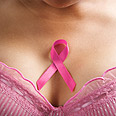
It is also often found in Jewish Ashkenazi women of Eastern European descent.
Triple-negative means the cancer is lacking three hormone receptors (estrogen, progesterone, and HER2) that provide fuel to most cancerous tumors.
As breast cancer carries a strong genetic link, daughters and granddaughters of patients with the cancer are often affected. The Weizmann team's experimental research utilizes methods that mimic the way the body normally responds to breast cancer, as they search for the first solution for triple-negative cancer.
“It’s quite a difficult disease,” Professor Yarden told ISRAEL21c. “Women who are initially treated with chemotherapy show a good response, but they eventually develop resistance to the chemical therapy. They die within seven or eight years.”
Along with his colleague, Professor Michael Sela, the two went on to develop a theory that may be able to improve survival rates in breast cancer patients, and reduce the number of re-occurrences.
They came to this conclusion by abandoning the normal method of developing medicines to fight cancer, which is traditionally done through attacking an antibody on the surface of the tumor. Instead the Israeli doctors combined two diverse antibodies to separate sections of the receptors, which resulted in a positive response during testing.
"If this approach is developed into a drug, it might treat about 5% of all breast cancer patients, a meaningful proportion considering the aggressiveness of triple negative," said Yarden.
While the two have only conducted their tests on animals so far, all of their research has proved very positive thus far, and they are looking to collaborate with pharmaceutical institutions to develop a drug.
Both Professors Yarden and Sela have stated that finding a vaccination that completely fights off cancer is their overall objective.
Their research has since been published in The Proceedings of the National Academy of Sciences.
Reprinted with permission from Shalom Life















